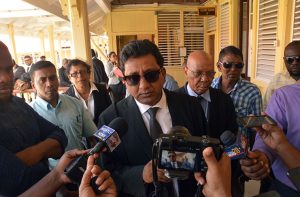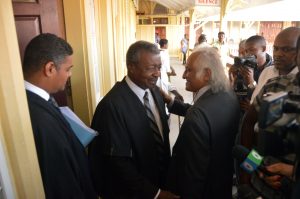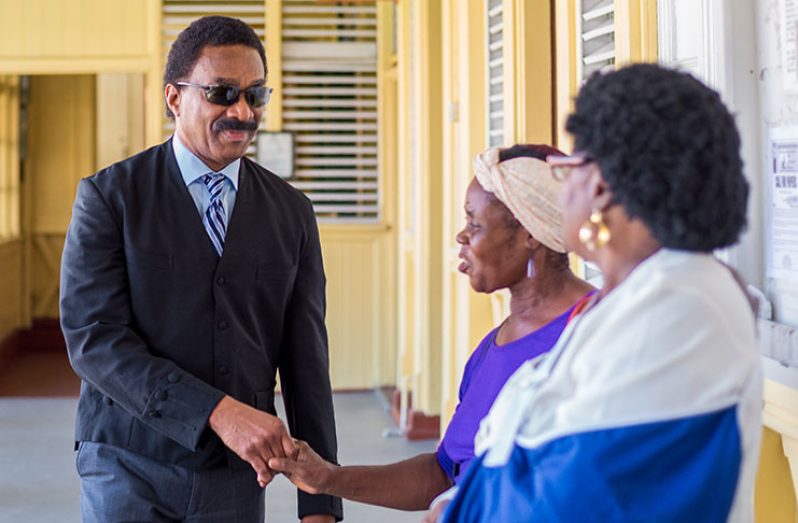–AG tells court in confidence vote case
…CJ to rule on Jan. 31
ARTICLES 106 (6) and 106(7) of the Constitution of Guyana ought to be interpreted together; to do the contrary, would be a recipe for anarchy, Attorney General Basil Williams told Chief Justice Roxane George-Wiltshire in the High Court as he rebutted arguments by Attorney-at-Law Kamal Ramkarran that Cabinet must resign.

Ramkarran, on behalf of his client Christopher Ram, has asked the High Court to declare that the No-Confidence Motion against the A Partnership for National Unity + Alliance for Change (APNU+AFC) Government was validly passed in the National Assembly on December 21, 2018, and as a consequence, the Cabinet must resign and the government should take up the role of a caretaker government. But his arguments in support of the declarations being sought were all debunked by the Attorney General when the first of three constitutional cases were heard on Wednesday. The Chief Justice will hand down her ruling in the matter on Thursday, January 31, 2019, at 13:30hrs.
Williams, who appeared on Wednesday in association with attorneys Maxwell Edwards and Mayo Robertson, along with State Solicitor Ayanna McAlmont, pointed out what he called the loopholes in Ramkarran’s arguments.
Williams, in his opening arguments, said Ramkarran, in arguing the case of his client, Christopher Ram, has depended heavily on statutory interpretation. This, he said, has led Ramkarran, and by extension his client, to construe the Constitution in a narrow and legalistic way when it should be interpreted broadly and purposively as to give effect to the spirit of the provisions.
“I believe that the applicant, Mr. Christopher Ram, can enter error with his narrow approach of statutory interpretation to our Constitution,” the Attorney General told the Chief Justice.
Williams, in laying the foundation for his arguments, pointed out that in the 1980 Constitution, the framers omitted the confidence motion clause, however, the clause in the 2000 Constitution made what he described as a “hasty reappearance.” According to him, Article 106 of the Constitution, which provides that “the Cabinet including the President shall resign if the government is defeated by the vote of a majority of all the elected members of the National Assembly on a vote of confidence,” was not well thought out.
He submitted to the Court that had the Applicant examined Article 106 (6) and Article 106 (7) together, he would have recognised Cabinet and government are used interchangeably. Article 106 (7) of the Constitution says “notwithstanding its defeat, the government shall remain in office and shall hold elections in three months, or such longer period as the National Assembly, by resolution supported by not less than two-thirds of the votes of all the elected members of the National Assembly determine, and shall resign after the President takes the oath of office following the election.”
Recipe for anarchy
Williams argued that the submissions made by Ramkarran that the Cabinet must resign while the government remains in office, with each minister or ministry answering to their own is like a “recipe for anarchy.” “We have 16 Cabinet ministers. We have ministers within certain ministries. We have a host of ministers…how are they going to coordinate? Would they mind read each other?” Williams questioned.
He further questioned, “if you have a national emergency, if there is public disorder in some geographic location, rioting; what would happen?”
Maintaining that there could be no distinction between Cabinet and government, he said the government must continue to govern the country without any limitation. He rubbished the notion of a caretaker government on the basis that such is not catered for by the Constitution.
Majority

Turning his attention to the issue of majority in the National Assembly, the Attorney General sought to draw a distinction between a simple majority and an absolute majority. He put to the Court that the Applicant did not consider the differences despite the grave consequences and implications of a successful vote of No-Confidence Motion.
He submitted that Article 168 (1) specifies that a simple majority is the majority of members present and voting, while Article 106 (6) requires a higher than simple or an absolute majority, that is, all elected members of the National Assembly. He cited Article 164 (1) as a case in point.
That article states that “….a Bill for an Act of Parliament to alter this Constitution shall not be passed by the National Assembly unless it is supported at the final voting in the Assembly by the votes of a majority of all the elected members of the Assembly.”
The Attorney General said the requirement as stipulated in Article 164 is more difficult than the passage of ordinary legislation which only requires a simple majority. Williams argued that the 33 did not constitute a majority, as such, the motion could not have been validly carried. He put to the court the time-honoured method of half plus one is what should have been used in the National Assembly on December 21, 2018, to arrive at the majority in the House.
Among the cases cited by the Attorney General was that of Kilman Kilman v Speaker of Parliament of the Republic of Vanuatu [2011] VUCA 15; Civil Appeal 09 of 2011 (13 May, 2011), and that of the case of UK Prime Minister Theresa May who won the confidence vote regarding her leadership. He put to the court that in the case of an uneven number, it is rounded up. When the UK’s 315 total is divided, it arrives at 157.5 members. This figure was rounded off to158 as what represents half of the total number of members while an extra vote [159] would represent a majority.
The Attorney General submitted to the Court that the hallow time principle of half plus one and rounding up the fraction is accepted worldwide.
Resignation
Meanwhile, with his client seated in the court’s chamber among other interested parties, Ramkarran argued that the provisions of Article 106 of the Constitution, which were put into motion on December 21, 2018, are clear and unambiguous, and as such, the Cabinet, which is separate and apart from government, should resign. The Cabinet, comprising the President, prime minister, vice presidents and other ministers, aids and advises the President and controls the government, Ramkarran told the High Court while contending that its resignation would not lead to chaos in the country.
“There is no chaos because the government remains in office. The President remains the President and the ministers remain ministers of government,” he said while noting that in the absence of the Cabinet, the government will operate with limited powers as a caretaker government.
According to him, government, upon the resignation of Cabinet, would only engage in “essential functions” but such would not include presenting bills to the National Assembly for consideration and passage or the signing of major contracts. Questioned by the Chief Justice on what constitutes “essential functions,” Ramkarran, while speaking hypothetically, said government defending Guyana if Venezuela were to invade or providing finance to the Guyana Elections Commission (GECOM) for the holding of elections, but he maintained that it would not be business as usual.
Holding fast to his position that the Cabinet must resign on the passage of a vote of No-Confidence, Ramkarran turned the Court’s attention to Section 39 of the Interpretation and General Clauses Act. He said while the Constitution does not say when the Cabinet should resign, Section 39 provides that “in any written law where no time is prescribed or allowed within which anything shall be done, such thing shall be done with all convenient speed…”
Addressing the issue of majority in the 65-Member National Assembly, Ramkarran said it is clear that 33 constitute a majority in the Parliament of Guyana and not 34 as proposed by the Attorney General. “Thirty-three is greater than 32. It is a number that is [more]than half,” he posited while adding that on the night of December 21, the “yes” votes exceeded the “no” votes.” Meanwhile, on the issue of dual citizenship, another issue which is being argued in the case, Ramkarran told the Chief Justice that a person who is elected to be a member of the National Assembly, whether qualified to be elected or not, is a member until such membership is set aside by the Court.
Anil Nandlall, who had earlier indicated to the Court that his client, Leader of the Opposition Bharrat Jagdeo, wish not to respond to the case brought by Ram because he is in support, opted to speak on Wednesday.
Like Ramkarran, he maintained that Cabinet is independent to government, and is required to resign upon a vote of no-confidence while the government remains in office. “Cabinet is simply the executive nucleus of the Government of Guyana, it is not the Government of Guyana,” Nandlall argued as he added his voice to the debates. He said Article 106 (6) of the Constitution requires one component to resign.
Dual citizenship
For his part, attorney Robertson addressed the issue of dual citizenship. Charrandass Persaud, before being expelled by the Alliance for Change (AFC) and recalled from Parliament, had used his vote to bring down his own government by supporting the Opposition-sponsored No-Confidence Motion, but the Attorney General and team are arguing that Persaud’s vote was invalid because he breached the Constitution by having dual citizenship while being a Member of Parliament.
He argued that Persaud’s illegal vote could not possibly find refuge in the provisions of Article 165 (2). That Article provides that “The Assembly may act notwithstanding any vacancy in its membership (including any vacancy not filled when the Assembly first meets after the commencement of this Constitution or any dissolution of Parliament) and the presence or participation of any person not entitled to be present at or to participate in the proceedings of the assembly shall not invalidate those proceedings.”
Robertson put to the Court that while the proceeding in the National Assembly was a valid one, with regards to the laying of the motion and the debates which followed, the tabulation of the votes was not reflective of the true situation, as Persaud could not vote because he held dual citizenship, contrary to the constitutional provisions. He argued that Persaud voted in the National Assembly when he knew he was in violation of the Constitution. Such illegality, Robertson argued, must not be condoned.




.jpg)










